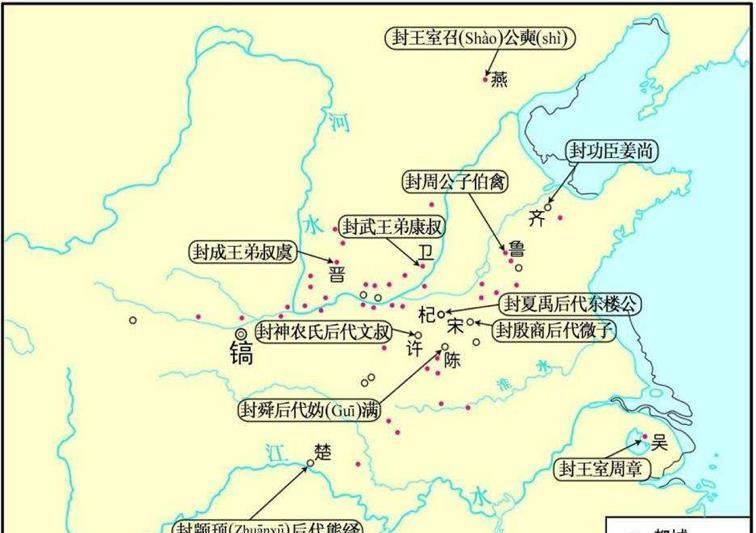To discuss this issue, we must first make it clear that there is a fundamental difference between the sub-feudal system of the Zhou Dynasty and the sub-feudal system of the Han Dynasty and the Jin Dynasty, and since the Qin unified the world, the sub-feudal system was changed to the county system, and finally established the monarchical system of later generations. Since then, the Han Dynasty has inherited the Qin system, and the set of sub-sealing systems at the beginning of the Zhou Dynasty has already existed in name only. Therefore, the Purpose of dividing the princes of the Zhou Dynasty, the Han Dynasty, and the Jin Dynasty at the beginning of the founding of the country was different.
The former is to resolve the contradiction between the "central" and the "local", and the latter two is to resolve the contradiction within the ruling class between the "imperial power" and the "royal power". The so-called causes and effects, the purpose of dividing the princes is different, and the results are naturally very different.

1. Western Zhou "feudal relatives, to the fanping week"
At the end of the Shang Dynasty and the beginning of the Zhou Dynasty, limited by the productivity, the zhou royal family could control and cultivate a limited range, coupled with the change of dynasties in the early Western Zhou Dynasty, whether it was the ruler and the people or the ethnic cohesion within the ruler was very low, based on the above needs, the Zhou Gong implemented the sub-feudal system, giving the princes the functions of managing regional rebellions, protecting the Zhou royal family, educating the people, etc. Under such a powerful function, the princes retained a relatively complete power system, such as retaining most of the power to appoint and dismiss personnel, so that the economy, military, Sacrifice and a range of other powers. The purpose of the King of Zhou at this time was to unite with the clan and meritorious people to consolidate the newly stabilized power and enhance the ethnic cohesion of the entire dynasty. Coupled with the influence of the patriarchal system and the liturgical system, it was believed that the use of lile education could manage the princes who held heavy power, so there was no gradual strengthening of centralized power, and in the later period, the Zhou Tianzi declined, the princes competed for hegemony, and the Zhou Dynasty collapsed.
2. "Han inherits the Qin system, there are gains and losses"
At the beginning of the Han Dynasty, due to the complete elimination of the princely states and kings with different surnames that had been divided for thousands of years, Liu Bang, the ancestor of Han Gao, on the one hand, inherited the absolute monarchy of qin shi huang from the central to the local vertical management, and vigorously promoted the county system in the Guanzhong belt; on the other hand, in order to fill the power vacuum left by the elimination of foreign queens, Liu Bang implemented a feudal system with imperial disciples as the main body. and
The difference between the Zhou Dynasty and the Zhou Dynasty is that the early Han Dynasty has achieved great unification, the purpose of dividing the princes is not to maintain stability, and the military and political functions of the princes are not as strong as at the beginning of the Zhou Dynasty, but a kind of compensation for the royal family under the county system.
After all, they are relatives of the emperor, are branches and symbols of imperial power, in order to maintain the sanctity of the emperor, the ruler must give them certain privileges, unite the ruling class, so the feudal royal family to a certain extent expanded the ruling base of the imperial power, very conducive to solving the contradiction between "imperial power" and "royal power". However, it was also precisely because the power of the princes under the county system was not large, coupled with various factors, in the end of the Han Dynasty, the eunuch Yu Chen came to power, the Qi Wang clan rose, and the Western Han Dynasty collapsed.
3. "The King and the Horse, The World Together"
In the second year of Wei Xianxi (266), Sima Yan forced Emperor Yuan of Wei to give way. At the time of the founding of the country, it received the support of many Gate Valve clans, and Sima Ben was a large family in the Cao Wei period. In the construction of the political foundation of the country, the contradiction between imperial power and the clan became a dark cloud at the beginning of the founding of the Jin Dynasty and even shrouded in the history of the Jin Dynasty for more than a hundred years. In order to resolve this contradiction, the Jin Dynasty implemented the nine-pin Zhongzheng system and the sub-feudal system to ensure the interests of the family clan, although the Distrust of the Founding Princes of the Western Jin Dynasty had reached an extremely sensitive level, and during the Tai Dynasty, the political strategy of "returning the first" and "foreign-surnamed Founding Princes" was carried out, and some of the kings with different surnames were eliminated. However, it still went back to the "sub-feudal system", did not further strengthen the centralization of power, and finally did not deal with the contradictions, resulting in the late Western Jin Dynasty, the Door Valve clans were divided, and the central power was sidelined.